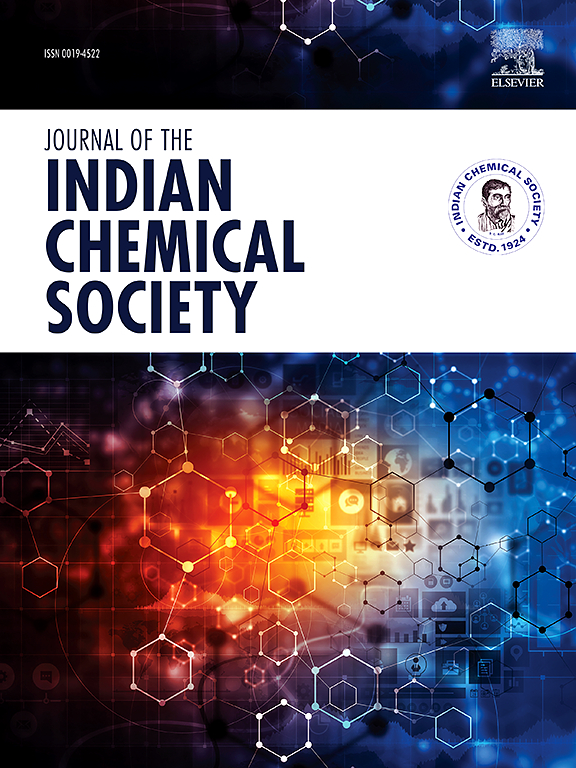生物质衍生乙酰丙酸烷基作为航空涡轮燃料(Jet a -1型)的潜在添加剂:混合配方和物理化学性质的评估
IF 3.2
4区 化学
Q2 CHEMISTRY, MULTIDISCIPLINARY
引用次数: 0
摘要
飞机/喷气涡轮发动机中常用的航空燃料是化石基石油燃料,是造成烟尘、芳烃、颗粒物和温室气体排放的主要原因。航空运输正在严重影响环境,并被认为是实现脱碳和净零排放使命中最具挑战性的部门。从传统航空燃料(CAF)到可持续航空燃料(SAF)的范式转变对于减少航空排放对环境的影响至关重要。这通常涉及生物基或生物质衍生的碳基液体燃料或添加剂,这些燃料通常在航空燃料中混合到一定比例。鉴于此,本研究确定了各种生物质基乙酰丙酸烷基酯(甲基、乙基和丁基)作为航空涡轮燃料(ATF)潜在添加剂的适用性。各种甲基、乙基和乙酰丙酸丁酯与航空燃料的共混物(0.25 - 10%)进行了不同性能的测定(密度、润滑性、运动粘度、芳香含量、烟点排放、铜条腐蚀、冰点、十六烷指数、净燃烧热(能量含量)、热氧化稳定性和CO2排放)。实验结果表明,乙酰丙酸酯混合航空燃料的润滑性能、密度、烟点、缓蚀能力、凝固点和运动粘度均有所提高,芳香含量、腐蚀能力和烟尘排放均有所降低。有趣的是,二氧化碳排放量(kg/L)被确定,计算表明,使用乙酰丙酸酯混合航空燃料,二氧化碳排放量减少了8.86%。目前的实验室实验结果表明,乙酰丙酸烷基酯作为ATF (Jet a -1型)的潜在添加剂具有广阔的应用前景。本文章由计算机程序翻译,如有差异,请以英文原文为准。

Biomass derived alkyl levulinate as a potential additive for aviation turbine fuel (Jet A-1 type): Blend formulations and assessment of physicochemical properties
The aviation fuel commonly used in airplane/jet turbine engine is fossil based petroleum fuel that is responsible for the soot, aromatics, particulate matter and greenhouse gases emission. Aviation transportation is severely affecting the Environment and finding as the most challenging sector in fulfilling the mission of decarbonization and net-zero emissions. A paradigm shift from conventional aviation fuels (CAF) to sustainable aviation fuel (SAF) is crucial that can reduce the environmental impact from the aviation emission. This typically involves the biobased or biomass derived carbon base liquid fuels or additives that typically blended to certain proportion in the aviation fuels. In view of this, the present work determines the applicability of various biomass-based alkyl levulinates (methyl, ethyl and butyl) as a potential additive for aviation turbine fuel (ATF). Various methyl, ethyl and butyl levulinate blends (0.25–10 %) with aviation fuel are subjected to determine the different properties (density, lubricity, kinematic viscosity, aromatic contents, smoke point emission, copper strip corrosion, freezing point, cetane index, net heat of combustion (energy content), thermal oxidation stability and CO2 emission). Experimental results showed that, lubricity property, density, smoke point, corrosion inhibition ability, freezing point and kinematic viscosity is improved while aromatic contents, corrosion ability and soot emission decreases for levulinate blended aviation fuel. Interestingly CO2 emission (kg/L) was determined and calculations suggested that, CO2 emission was reduced by 8.86 % for the use of levulinate blended aviation fuel. The present laboratory experimental results demonstrated promising scope to use of alkyl levulinate as a potential possible additive for ATF (Jet A-1 type).
求助全文
通过发布文献求助,成功后即可免费获取论文全文。
去求助
来源期刊
CiteScore
3.50
自引率
7.70%
发文量
492
审稿时长
3-8 weeks
期刊介绍:
The Journal of the Indian Chemical Society publishes original, fundamental, theorical, experimental research work of highest quality in all areas of chemistry, biochemistry, medicinal chemistry, electrochemistry, agrochemistry, chemical engineering and technology, food chemistry, environmental chemistry, etc.

 求助内容:
求助内容: 应助结果提醒方式:
应助结果提醒方式:


